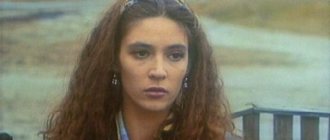Childhood and youth
Lydia's maternal great-grandfather lived in Transbaikalia. His daughter, married to the Don Cossack Fomin, left with her husband for Manchuria. The paternal grandparents also lived in China, the head of the family was an officer. After leaving military service, he took up beekeeping. His son Vladimir Tsirgvava, after training, became an employee in the management of the Chinese Eastern Railway. In Harbin he met Lydia Pavlovna Fomina.
Lydia Vertinskaya
On April 14, 1923, the couple had a daughter. The name was chosen for her in honor of her mother. Lydia Jr. grew up in the Georgian community, surrounded by relatives and family friends. But the cloudless childhood did not last long. When the girl was 10 years old, her father died. Three years later, their godfather Vladimir Karseladze, who supported them, left for the USSR, and subsequently he was repressed.
Lydia Tsirgvava Sr. moved with her child to the port city of Chifu (now Yantai). The girl was sent to a closed boarding school organized at a Catholic convent. Later, the family moved to Shanghai, where Lydia began attending a private English school. Having received her basic education, the girl took shorthand courses and in 1940, when she was 17 years old, she got a job as a secretary at a shipping company.
Lydia Vertinskaya in her youth
That same year she met her future husband. Alexander Vertinsky, then 51 years old, arrived in Shanghai after a long period of living in Europe and the United States. His performance amazed the girl, and he himself was so fascinated by the young fan that he subsequently often called himself a “prisoner of the Caucasus.”
The significant age difference horrified Lydia's mother. Despite her position and attempts to dissuade the girl from getting married, in the spring of 1942, Lydia Tsirgvava and Alexander Vertinsky not only registered their marriage at the USSR Embassy in Japan, but also underwent a church ceremony in the temple. According to Lidia Vladimirovna’s memoirs, “all Russian Shanghai” gathered for the celebration.
Lydia Vertinskaya and Alexander Vertinsky with their daughter Marianna
The family's financial condition deteriorated sharply after Japan's attack on China. The occupiers did not allow foreign goods into Shanghai, and a shortage quickly set in. According to Vertinskaya’s recollections, her husband bought the tailcoat from the pawnshop before each concert and pawned it again as soon as he left the stage. Since the beginning of the war, Alexandra also had been haunted by the thought of returning to her homeland. He repeatedly applied for permission to return to the USSR, but only in November 1943 received a positive response. Vertinsky came to Moscow with his wife, mother-in-law and newborn daughter Marianna.
Georgian, born in China
The October Revolution upended many lives and orders in Russia.
Outside Russia, too, the Russian diaspora in China found itself completely cut off from their homeland. Who would be waiting for them there, the “former” ones, who are by no means proletarians? The Russians in Harbin were building the Chinese Eastern Railway, and those who did not build, provided goods or services to those who did. The main labor force, the proletariat, were, of course, the Chinese - why bring it from afar? Russian Harbin residents reacted differently to the collapse of the empire. Some clung to the preservation of old customs and orders as the meaning of life. Others realized that the old world ended with the First World War. Now the son of a princely family could marry the daughter of a tradesman; This is how, in general, the couple of Vladimir Tsirgvava and Lydia Fomina formed. When the opportunity arose to gain at least some status, they agreed to Soviet citizenship - for many Harbin residents this meant recognition of their human rights by the Chinese government without a real change of residence. This was the agreement between the USSR and China regarding those who served the CER.
The issue of accepting citizenship then greatly divided the Russian Chinese.
Monarchists considered those who became Soviet citizens to be traitors. Monarchist citizens living without any legal status at all were seen as betraying the interests of their children. Young communists from grown-up young Harbin residents and Russian fascists (this is not a joke, this is the official name of the organization) were added to this confrontation. In conditions of such a vinaigrette, the daughter of a Soviet employee, a living crime against the purity of Russian blood, Lydia Tsirgvava Jr., grew up in Harbin.
Although she was named after her mother, the girl grew up very similar to her father: the same gray-blue eyes, pale white skin, reddish dark hair and, of course, nose. Her nose gave her away as Tsirgvava with her head. Character too. Lydia had a hot, even fiery, disposition. The war found her in Harbin. People around were happy that the Japanese would restore order - or were horrified by war crimes, gloated about the death of the hated proletariat on the Western Front - or were worried that Russian soil was being trampled by German boots.
Films and creativity
After moving, the family lived at the Metropol Hotel for three years. Here, on December 19, 1944, a replenishment took place: a daughter was born, who was given the name Anastasia. Vertinsky performed at the front with a patriotic repertoire, Lydia remained in Moscow. In 1946, the family received a large apartment, in which Lydia lived for the rest of her life.
Lydia Vertinskaya in the film "Sadko"
After the war, Lydia entered the painting department of the Moscow State Art Institute named after Surikov. While still studying, in 1952, she met director Alexander Ptushko. He had just started filming the fairy tale “Sadko” and saw the Phoenix bird in Lydia. This role became the debut for Vertinskaya, although due to her sonorous voice, which did not suit the image, she was voiced by an understudy.
Lydia Vertinskaya in the film "Don Quixote"
Over the decade (1952 – 1963), Vertinskaya played the duchess in the film “Don Quixote”, starred in two fairy tales directed by Alexander Rowe (“The New Adventures of Puss in Boots”, “Kingdom of Crooked Mirrors”), and appeared in the second series of the film “Kievlanka” . But cinema did not become her destiny, despite the memorable images.
Lydia Vertinskaya in the film “The Kingdom of Crooked Mirrors”
In 1955, Vertinskaya graduated from the institute and began working at a printing plant. The sale of paintings and prints supported the family’s financial condition for a long time, including after the death of Alexander Vertinsky. The main theme of the artist’s work was nature. Her landscapes and still lifes have repeatedly participated in various exhibitions.
Lydia Vertinskaya. Fatal beauty and tender love
I, of course, have seen enough screen beauties, but only this extraordinary woman managed to evoke untimely aesthetic delight in me.
Many people admire the fatal beauty of Lydia Vertinskaya, but many say that her appearance is not for everyone. One cannot but agree with this, but I am a lover of such beauty! Soft “cats” leave me indifferent, but for the most part it is these fatal characteristic beauties with sizzling looks, sharp predatory facial features, regal bearing and extraordinary energy that fascinate me, when a flame breaks through the outer icy arrogance. Marlene Dietrich, Greta Garbo, Pola Negri, Lauren Bacall, Cappuccine is my everything! But the most beautiful of all is the unique Phoenix bird from childhood...
Photos, in my opinion, do not convey half of its magic.
Lidia Vladimirovna was born and raised in China. Her father, a descendant of a Georgian princely family, and her mother lived there. The father died when the girl was nine years old. Lidochka studied at a monastic school, but the teachers only grabbed their heads, she was such a playful child. And when she grew up, another problem appeared - fans. The girl grew up cheerful and flirtatious, she was not a recluse. But of all the candidates for husbands, she set her sights on the artist Vertinsky: he was 34 years older. When the artist arrived on tour in Shanghai, Lidochka and a group of friends went to a variety show, where he gave a concert. The first impression was decisive. Vertinsky, shrouded in clouds of cigarette smoke, in a black tuxedo, with smoothly combed hair, sang in a bewitching voice. The girl was stunned. The singer also immediately fell in love with the young beauty. Two years later, on April 26, 1942, a wedding took place in Shanghai.
On November 4, 1943, Lydia, her husband and mother left for Moscow. At that time, she was already the mother of three-month-old Marianna. The Vertinskys were received well in their homeland: they were given a luxurious room at the Metropol Hotel, and then the family received a spacious apartment.
In 1955, Lydia graduated from the painting department of the Moscow State Academic Art Institute named after V.I. Surikov and began working as a professional artist at a printing plant and took part in exhibitions.
Vertinskaya did not intend to make a film career. But one day the Soviet film director Alexander Ptushko saw her. He immediately invited her to play the role of the magical bird Phoenix in his new film “Sadko”. This role became her film debut. In the film, she was voiced by another woman, since a low voice was needed, but hers was sonorous.
I had a photogenic face. That's why I was invited to act in films. I’ve never been an actress, I just learned the role and came to rehearsals,” admitted Lidia Vladimirovna. But Lydia Vertinskaya’s aristocratic appearance attracted attention to the debutante: a few years later she played the Duchess in Kozintsev’s Don Quixote.
And in the film “The New Adventures of Puss in Boots” Vertinskaya was a charming Witch.
I remember that it was in this film that Vertinskaya’s alien appearance first struck me! At the very beginning of the fairy tale, there is an episode where the card Queen of Spades takes on the guise of an actress. Since then, the Queen of Spades for me is not Pushkin’s evil old woman, but rather the fatal beauty Vertinskaya.
In the military drama “Kievlanka” Lydia Vertinskaya played the role of Frau Martha (a German officer, administrator at a telegraph agency in Kyiv).
Vertinskaya's filmography is limited to only 5 works. Perhaps the most striking and widely known is her last role - the insidious beauty Anidag in the fairy tale “The Kingdom of Crooked Mirrors”.
In this film, the fatal beauty and mystery of Vertinskaya are revealed most fully. The actress is crazy about massive jewelry, high hairstyles and even bright makeup, which on another actress and under other circumstances would spoil her appearance and look vulgar. And the screen tandem of Lydia Vertinskaya and Andrei Fait (he played Minister Nushrok) in my opinion is one of the most spectacular, aristocratic and demonic in Russian cinema.
Unfortunately, the role of Anidag was the last for Lydia Vertinskaya. She was not a great actress (and did not strive to be), but all her images were remembered and made an impression on the viewer. She played special women: regal, rebellious, captivating. Vertinskaya was a fabulous beauty, both literally and figuratively. With all the variety of talented and spectacular actresses in Soviet cinema, no one even a little like Lydia Vladimirovna has appeared on the screen since then.
Both Vertinsky daughters can boast of much more successful and long-lasting film careers. The eldest, Marianna, Honored Artist of the RSFSR, played more than 20 roles in films, including in the legendary “Ilyich's Outpost” by Marlen Khutsiev. The youngest, Anastasia, became a people's artist, one of the most prominent actresses of the Soviet Union. Both, like their mother, mainly played beauties of noble birth.
Lydia Vladimirovna was widowed at the age of 34. In 1957, Alexander Nikolaevich died on tour. Lydia lived with Vertinsky for perhaps 15 of the happiest years of her life. Her mother helped the young woman with the housework. And although Alexander Nikolaevich went on tour all the time, correspondence with his wife did not stop for a single day. Next to his cheerful and young wife, Vertinsky himself felt more joyful and spontaneous. When they appeared in public together, those around them were impressed by the beauty and exoticism of the famous artist’s young wife. She Lydia Vertinskaya often wore luxurious dresses made of oriental fabric, and a turban on her head.
Alexander Nikolaevich understood that he was much older than his wife, and was worried about the future of his wife and children. What will happen to them if he dies? Therefore, he agreed for his wife to study and get a profession. And he showered her with gifts: he bought Lydia jewelry and antiques. Subsequently, many, even relatives, recalled that Vertinsky’s relationship with his young wife was more reminiscent of the tenderness of a father and daughter than a union of people passionately loving each other. Maybe so, but after the death of her husband in 1957, Lydia Vladimirovna could not even allow remarriages. Although offers have been received more than once - and very good ones. Vertinskaya carried her love for her husband, reverent attitude towards his memory and talent throughout her long life.
Maybe it’s just a beautiful legend, but here’s how Lydia Vladimirovna’s granddaughter Daria Khmelnitskaya recalls the last hours of the actress’s life: “My grandmother was sick for a long time, and we understood that she was leaving. She turned 90 this year, after all, and thank God that she lived so long. We were next to her in her last moment, all together: me, my sister and our mother (Marianna Vertinskaya), and Anastasia Vertinskaya. We sat next to each other, held hands, turned on my grandfather’s CD, and she listened to it all. She left very carefully and quietly. Right under Alexander Nikolaevich’s song “Your fingers smell like incense,” my grandmother opened her eyes and looked at us, and at the phrase: “The Lord himself will lead you along the white stairs to a bright paradise,” she took her last breath...”
She was a rare beauty (she delighted some, frightened others, but left few indifferent) and a woman of rare dignity and devotion. Are there many of these now? Bright memory.
Personal life
All her life Lydia Vertinskaya supported her husband. In the post-war years, his work was not officially banned, but was perceived with cold indifference by critics. Despite his worldwide fame, in the USSR it was difficult to find a record with Vertinsky’s songs or see a poster for his performance.
Lydia Vertinskaya and Alexander Vertinsky
Experiencing a deep crisis, Vertinsky continued to tour to provide for his family. At the same time, being far from home, he, as in the first years of the relationship, wrote letters to his wife full of love and tenderness. Some of them were published in Lydia Vertinskaya’s autobiographical book “The Blue Bird of Love.”
The happy marriage lasted 15 years. In 1957, while on tour in St. Petersburg, Alexander Vertinsky died of acute heart failure. Lydia was 34 years old. Since then, she has not had affairs or accepted marriage proposals, although she outlived her husband for many years.
Marianna and Anastasia Vertinsky
Their daughters became actresses. Marianna Vertinskaya was married three times and raised two daughters: Alexandra Vertinskaya and Daria Khmelnitskaya. Alexandra also has two daughters, Marianna’s granddaughters. Lydia's youngest daughter Anastasia Vertinskaya was married to Nikita Mikhalkov for three years. The couple had a son, Stepan. He is married and has three children.
Forbidden love
Lydia Vertinskaya (née Tsirgvava ) was born on April 14, 1923 in Harbin, a city in northeastern China. Her father, Vladimir Konstantinovich Tsirgvava, headed the management of the Chinese Eastern Railway. As fate would have it, the legendary Russian chansonnier Alexander Vertinsky also ended up there: he was never able to accept the revolution and emigrated to China.
Lydia was only 17 years old when she met the 51-year-old singer. Despite the huge age difference, they fell in love with each other. Tsirgvava, according to the memoirs of contemporaries, was incredibly beautiful: perfect, porcelain-white skin, an unusual shape of huge eyes, luxurious hair, a chiseled figure. Despite the fact that Lydia’s mother was against marrying such an old groom, the girl still married Vertinsky two years after they met. They got married in 1942 at the Shanghai Cathedral. When the first daughter was born in the family, she was named Marianna : in honor of the lady of the heart of the robber Robin Hood, the film about whom was then incredibly popular.
During World War II, the Vertinskys decided to return to the USSR in order to be close to their fellow citizens in a difficult moment. In her autobiographical book “The Blue Bird of Love,” Vertinskaya admitted: “...The war in Russia stirred up in us Russians love for the Motherland and anxiety about its fate. Alexander Nikolaevich passionately convinced me to go to Russia and be with the Motherland in its difficult hour. I also began to dream about it.”
Alexander Vertinsky, his wife Lydia and daughter Anastasia. Photo: RIA Novosti/Tikhonov
In November 1943, the Vertinsky couple with baby Marianna and Lydia’s mother, Lydia Pavlovna , moved to Moscow and settled in the Metropol Hotel, where they spent three years. In 1944, Lydia Nikolaevna gave birth to a second daughter: Anastasia .
After three years of living in a hotel, the family finally got an apartment. “Mom didn’t touch the housework. Dad adored and cherished mom. He instilled in her that she was an ideal, and until the end of her life nothing could shake her mother in this conviction,” the famous actress Anastasia Vertinskaya . “My grandmother, her mother, took care of the house. She knew many cuisines: Chinese, Russian, Georgian, and Korean.”
The Vertinskys lived without the everyday modesty customary in the Soviet Union; for example, the girls had bonnies (nannies). “One day, sitting at the table and looking at my sister and me very carefully, dad said to mom: “Lilechka, dear, don’t you think that we are not raising our two bitches as Soviet citizens?” Anastasia Vertinskaya told AiF. “And Masha and I were sent to a pioneer camp.”
Nastya and Masha were given expensive German suitcases with dresses, scarves, and beautiful collars to draw on rulers. When the girls returned home, they had only one foreign, cheap suitcase for two with a faded T-shirt inside. Alexander Nikolaevich greeted his daughters in a jacket and bow tie, Lidia Nikolaevna also put on an elegant dress and high-heeled shoes. And Masha and Nastya, having sworn at their parents, ran to the kitchen and began to grab food straight from the frying pan. “Dad went to the office. From behind the closed doors, my mother’s sobs and whispers could be heard... We were again given to the Bonns to raise. Only it was too late,” Anastasia Vertinskaya told AiF.
Lydia Vertinskaya, “Sadko” (1952). Still from the film
Death
Lydia Vertinskaya lived to be 90 years old. She passed away on December 31, 2013. The actress and artist spent her last days in the hospital. The cause of death was a long illness, as daughter Marianna told reporters.
The grave of Lydia Vertinskaya and her husband Alexander Vertinsky
Shortly before her death, she listened to her husband’s song “Your fingers smell like incense,” which he wrote a whole century earlier, dedicating to Vera Kholodnaya.
Lydia Vertinskaya was buried at the Novodevichy cemetery. Her grave is located next to her husband's grave.
Widowed at 34
In the first years of marriage, Lydia Vertinskaya did not work; Alexander Nikolaevich constantly toured to provide for his family. One day, the famous director Alexander Ptushko saw Vertinsky’s wife . He was so amazed by the woman’s unusual beauty that he immediately invited her to play the role of the magical bird Phoenix in the fairy tale “Sadko”. At first, Lydia saw it more as a chance to have a good time than as the start of a career. However, in the end, Vertinskaya played in five films: in “Sadko” - the Phoenix bird, in “Don Quixote” - the duchess, in “The New Adventures of Puss in Boots” - a young witch, in “Kievlyanka” - Frau Martha, in “The Kingdom of Crooked Mirrors” " - Anidag. But the images she created were so vivid that they were remembered by the viewer forever.
Despite the fact that the family was far from poor thanks to the almost constant work of the famous singer, it was Vertinsky who insisted that Lydia Nikolaevna get a profession. He kept asking his young wife: “I will be gone, and how will you live?” In addition, due to frequent performances in unheated clubs, he began to get sick often. In 1955, Lidia Nikolaevna graduated from the Surikov Institute. At first, the profession of an artist did not bring her any income. But then she mastered linocut, and her works began to be published. Finally the fees came. They were very useful, because soon Lydia Nikolaevna herself had to support her family. In 1957, Alexander Nikolaevich passed away: he gave his last concert in May at the House of Stage Veterans in Leningrad and died at night in the hotel, his heart could not stand it. “In those years, telephone communications worked poorly; connections took a very long time,” Anastasia Vertinskaya told AiF. — I remember the night call. I left the room and saw my mother sitting with a pipe. For some reason I asked: “Mom, what?” Is dad dead?” She shouted: “Are you talking nonsense? Go to bed!“ And then the connection happened, some alien voice said something to my mother. She turned white... She experienced her father’s death tragically.”
Lydia Vertinskaya (right) and her daughters Marianna (center) and Anastasia at the opening ceremony of a memorial plaque on house number 12 on Tverskaya Street in Moscow, in which Alexander Vertinsky lived since 1943 after his return from emigration to his homeland. Photo: RIA Novosti/ Alexander Polyakov
Long years of loneliness
Lydia Vertinskaya received offers to remarry. Personal life turned out differently. There was no one equal to her late husband. But we had to raise our daughters, Marianna and Anastasia. Here the artist’s education came to the rescue. She made a living from this craft, selling her prints and landscapes. Irregular filming also helped financially. Lydia Vertinskaya (photo below) as the Phoenix bird was magnificent.
This is one of her most beautiful works. There were also roles in the films “The New Adventures of Puss in Boots” and “The Kingdom of Crooked Mirrors”. But Lydia Vladimirovna devoted the remaining time to her husband’s archive, putting it in order and organizing it. The daughters grew up to be extraordinary beauties and became actresses known throughout the country.
Then the grandchildren appeared. Grandson Stepan Mikhalkov is a famous and successful restaurateur. Granddaughter Alexandra Vertinskaya is an artist and TV presenter of the program “Take it off immediately.” The second granddaughter is Daria Khmelnitskaya.
Lydia Vertinskaya died at an old age (90 years old) and was buried next to her husband at the Novodevichy cemetery.
This is what her grave looks like. Lydia Vertinskaya lived a long and difficult life. Her biography is colorful and intricate. Carefree youth next to a great singer who lovingly fulfilled her whims and caprices, an independent life for which she had prepared, a large family consisting of celebrities - everything was in her life.
Marriage and return to Russia
It’s hard to describe how beautiful seventeen-year-old Lidochka was. Huge almond-shaped eyes, wavy thick hair, slender figure. She had already received marriage proposals, but Alexander Nikolaevich eclipsed everyone. He proposed, but the mother insisted that her daughter refuse: a huge age difference, the fame of the conqueror of women's hearts. But the Second World War began, Japan attacked China. With a man in the house, and with a world celebrity, in this difficult time it is calmer and easier. They got married on May 26, 1942, and a happy Lydia Vertinskaya appeared.
But after the Japanese occupation, although Vertinsky performed two concerts per evening (he worked extremely hard), the family’s financial situation became very difficult. They were in great need. According to Lidia Vladimirovna’s recollections, it was impossible to purchase even an aspirin tablet. After a long, humiliating correspondence with Soviet officials, permission to return to their homeland was received. At the end of 1943, Vertinsky arrived in Moscow with his wife, little daughter and mother-in-law.











